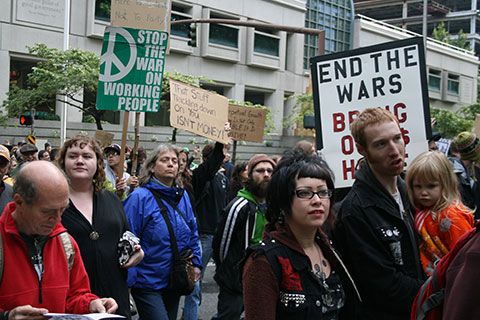MHCC students join fight to occupy Portland
MHCC students are among those who have become involved with Occupy Portland, the local demonstration that is in peaceful solidarity with Occupy Wall Street.
Occupy Portland has literally taken over Lownsdale Square in downtown Portland. On Oct.15, Portlanders marched through the city streets, holding signs with phrases such as “99% pissed off” and “Eat the Rich” and advocating for Ron Paul in the 2012 election, all while chanting, “Whose street? Our street!”
The various things being protested ranged from the war in Iraq to big banks, with protestors urging people to close their bank accounts. They also advocated for the 99 percent, meaning 1 percent of the population holds the country’s real wealth and the 99 percent are lower- and middle-class people.
MHCC student Cyan Wunderlich has been active on the weekend occupy site.
“The cool thing is after we passed the park (Lownsdale) and then went two blocks farther east and circled back, we could still see the tail end,” Wunderlich said about the Oct.15 march.
Wunderlich estimated that there were roughly 7,000-10,000 people at an Oct. 6 march and around 3,000 people on Oct. 15.
“Basically, our economy is tanking, we are really unhappy our money doesn’t belong to us and we can’t get jobs because of corporate greed,” Wunderlich said about how the Occupy movement came around.
MHCC student Erika Salisbury has been involved with Occupy Portland since the Oct. 6 march. Since then she has been contributing on social networking sites and spreading the word at school.
“I asked one of my teachers permission if I could stand up in front of class, right before class started. I did a little speech, saying ‘I want to invite everyone in the class and this is what it is about and it doesn’t matter if you’re left wing or right wing. It’s for everyone.’ I got one student really involved and we’ve been talking a lot.” Salisbury said.
The occupation in Lownsdale Square is indefinite and has no end date. According to Wunderlich, in a protest people show up and make demands then go home; in an occupation, it means the people stay and it is indefinite, she said.
Wunderlich said the occupations will go until something is done. “We are picking up after ourselves and cleaning the bathrooms. The city should but since we are occupying, we are showing that we are willing to take care of something we believe in and care for,” Wunderlich said.
“A lot of young people and a lot of students have to pay to get education during a time where people are unable to pay such ridiculous prices and can’t afford to pay an arm and a leg,” Wunderlich said of how students are affected the most. Because of this, many college and high school-aged people have joined in the cause for change in this country.
“We hope to get the money and careers back in the hands of the people. We don’t believe that any citizens in any country should have to pay for the mistakes of the private sector.” Wunderlich said of the Occupy Portland goals.
Wunderlich has participated in several of the marches and camps out on Friday and Saturday nights in a friend’s tent because of school during weekdays.
“We as the citizens of the United States of America have been shortchanged and belittled and treated like trash and we are sick of it. Being part of that class has made me want to show support for this occupation,” Wunderlich said.
Wunderlich believes there needs to be some serious change for the country.
“We might march again. I think we need to do more than just sit around and occupy,” Wunderlich said. “Not everybody can occupy, but a lot of people can protest, which is good. We like to see support,” Wunderlich said.
Salisbury said she loved going to the march but has not been downtown since. “I’m more likely to support in person if it stayed anti-drug, anti-alcohol” Salisbury said.
“I do a lot of support offsite. I’m less likely to go back the more that we are having the problems with the teenagers that are bringing in the drugs and alcohol and are making us look bad, because I don’t want any personal conflict with the police.” Salisbury said.
Salisbury’s involvement in the last few weeks has been much more social networking based.
“They have it set up to where there is certain committees so you can help in whatever your strengths or your connections are, so some people bring supplies and some do legal things. I’m in the Twitter committee, cause I already tweet a lot so I’m one of the main people of that so basically you just go onto the website, there’s a forum so you just say, “Hey, it’s me, I’m with the Twitter committee, how’s the committee going?” You just help where your strengths are.” Salisbury said.
Salisbury urges people to help where they can, even if they do not attend the marches or even camp out.
According to Salisbury, Internet help is just as great as being there. “If you are educating, doing outreach and who knows, you could have a friends list of 200 people and someone on there could be totally interested in this and they didn’t know about it. Then they read your post and say, ‘Tell me more.’ So it’s just as helpful if you’re not there, because a lot of people have work obligations and school.”
‘I’ve been crazy involved in the Twitter and that takes up so much of my time and it’s gotten in the way of homework a little bit. Twitter is great for outreach and so many people are misinformed,” Salisbury said.


Leave a comment